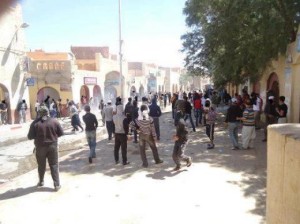- Washington “follows with interest” Morocco’s openness onto Africa (John Kerry)Posted 11 years ago
- The trial of South African Paralympic champion Oscar Pistorius opened in Pretoria on Monday.Posted 11 years ago
- USA welcomes efforts of King Mohammed VI in MaliPosted 11 years ago
- Egypt’s population reaches 94 millionPosted 11 years ago
- Mugabe celebrates his 90thPosted 11 years ago
- Moroccan Monarch to Build a Perinatal Clinic in BamakoPosted 11 years ago
- King Mohammed VI handed a donation of bovine semen for the benefit of Malian breeders.Posted 11 years ago
- Moroccan King’s strategic tour to Africa: Strengthening the will of pan African Solidarity and stimulating the south-south cooperation mechanisms over the continentPosted 12 years ago
- Senior al-Qaida leader killed in AlgeriaPosted 12 years ago
- Libya: The trial of former Prime Minister al-Baghdadi AliPosted 12 years ago
From International Media: Precarious calm in Algeria’s strife-hit Ghardaia
Calm has returned to the old Algerian desert city of Ghardaia, after some 40 days of ethnic clashes, but everyone remains cautious.
With violence erupting between the Chaamba community, of Arab origin, and Mozabite Berbers of the Muslim Ibadi sect, police and national gendarmerie’s anti-riot forces have been deployed in the area — 600 km south of Algiers and not far from the country’s largest oil and gas regions, including Ouargla and Tamenrasset.
The events which broke out on Dec. 8 and eventually calmed by Jan. 23 left two Mozabite youths dead and hundreds injured. Similar conflicts occurred in 2008 and 1985 over land property, but no deaths were reported.
The most circulated version of the cause of the conflict is that the disclosure of the list of beneficiaries from state-supported houses allegedly revealed a bias for Berbers and marginalized Arabs.
Some angry members of the Arab community took to the street to protest the “unfair” list and pressure authorities into reviewing it. Feeling threatened, Mozabite Berbers decided to stand guard in front of their properties.
The situation reportedly escalated when someone, allegedly drunk, from the Arab El-Mudjahidine neighborhood taunted anti-riot forces with obscenities. Clashes soon erupted and similar confrontations between the Mozabites and Arabs spread to other villages. Some Mozabite shops were set alight, and an historic tomb destroyed before the Mozabite responded in kind by setting fire to some Arab homes.
Located in downtown Ghardaia, El-Mudjahidine is known by locals as “Zqak Lihud,” or “the Jews alley,” in reference to the Jewish community that used to live there during the colonial period and even before. Some now say the neighborhood is a safe haven for drug dealers and criminals.
“Authorities have to think about dealing with this crisis from its roots: in my opinion, if they provide good living conditions to the populations of this city, all the problems would fade away!” said Khaled Ziani, an Arab resident from El-Mudjahidine.
“Look at these crowded small houses; look at our unemployed youths,” said Hocine Ressili, a member of the elders council of the Chaanba Arab community.
“Our neighborhood is accused of being a safe haven for drug dealers and criminals. I’d say this may be right, but I’d like to stress that our youth don’t have any recreation spaces such as stadiums, youth centers, or cultural clubs; they are vulnerable to drugs,” said Ressili.
Although calm has been restored to the 11-century-old city, Mozabite inhabitants have set up guard groups to secure their neighborhoods. “We still fear that Arabs will come here and attack us,” admitted a 50-year-old member of the Mozabite community. “We had never thought the situation would deteriorate as it did.”
Reluctant to use the correct terms, the two sides refer to each other as “those,” reflecting just how deep the divide is between the communities, long known for their coexistence and tolerance.
Arabs and Ibadis, in addition to Jews and Christians, used to live here in complete harmony, said Ziani.
But, Nacer, a 65-year-old Mozabite trader, said: “There is still lack of trust; we don’t trust them anymore, because they are perfidious.
“Yes, calm has returned, but you should know that the Arabs are boycotting our markets, and this decision has had a negative impact on our trading. Sales have heavily dropped, and we don’t know what to do.”
Ibrahim Behaz, head of the communication cell of the elders council of Ksser Ghardaia, believes the sedition was “fuelled by police who were flagrantly biased to the Arab community when the clashes erupted.”
“Everybody saw how police intervened to protect the Arabs, leaving us on our own facing the danger,” said Behaz, a professor at the University of Ghardaia.
He believes the solution to the strife lies in the hand of the government. “The state must reinforce its presence in Ghardaia, to protect its residents, either Mozabites or our brotherly Arabs.”
“Our claims are clear: The state has to provide indemnity to people who lost their properties during these deplorable events,” he said. “We require also to sue in justice all criminals who participated in the strife, including security officials.”
A security source in Ghardaia told Xinhua that as many as 14 police units have been deployed in the city. In all, over 2,000 anti-riot forces are assigned the mission of restoring law and order.
“Calm returned … but I can’t predict what could happen in the future. Hopefully it’s peace for good,” a national gendarmerie official said.





